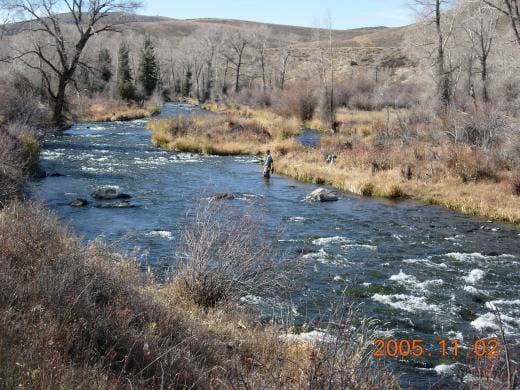
PRESS RELEASE
March 4, 2014
FOR IMMEDIATE RELEASE
Denver Water, Trout Unlimited, Grand County reach agreement on river protections for Moffat Project
The deal, years in the making, provides water management and project funds to benefit Fraser River habitat, trout populations
(Denver) Denver Water, Trout Unlimited and Grand County today announced agreement on a package of river protections designed to keep the Fraser River and its trout populations healthy.
The Mitigation and Enhancement Coordination Plan brings to a close several years of discussions over the proposed Moffat Collection System Project and its potential impacts on the Fraser River. All sides hailed the stakeholder agreement as a breakthrough that balances municipal needs and environmental health.
Trout Unlimited called the agreement a victory for the river.
This package of protections and enhancements, if adopted in the final permit, gives us the best opportunity to keep the Fraser River and its outstanding trout fishery healthy far into the future, said Mely Whiting, counsel for Trout Unlimited. This pragmatic agreement underscores the value of a collaborative approach to water planning one that recognizes the value of healthy rivers. It shows that, working together, we can meet our water needs while protecting our fisheries and outdoor quality of life.
In an effort to move past a disagreement on impacts from the Moffat Project, Grand County reached out to Denver Water and Trout Unlimited to propose additional environmental mitigations, said Lurline Curran, Grand County manager. To all parties credit, this effort has succeeded.
The Fraser is a river beloved by generations of anglers, boaters and other outdoor enthusiasts its the lifeblood of our community, said Kirk Klancke, president of TUs Colorado River Headwaters chapter in Fraser and a longtime advocate for the river. As an angler and Fraser Valley resident, Im gratified that this agreement keeps our home waters healthy and flowing.
The package includes environmental enhancements and protections to ensure the Fraser River will be better off with the Moffat Project than without it, said Denver Water. The Moffat Project will improve the reliability of Denver Waters system, which serves 1.3 million people in the Denver-metro area.
The centerpiece of the agreement is Learning by Doing, a monitoring and adaptive management program overseen by a management team that includes Denver Water, Grand County, Trout Unlimited, Colorado Parks and Wildlife, the Colorado River District and the Middle Park Water Conservancy District. Upon the project permit being issued, the management team will implement an extensive monitoring program to assess stream health based on specific parameters including stream temperature, aquatic life and riparian vegetation health. Water, financial and other resources committed by Denver Water through project mitigation, the Colorado River Cooperative Agreement and other agreements will be deployed to prevent declines and improve conditions where needed.
Learning by Doing is a unique and groundbreaking effort to manage an aquatic environment on a permanent, cooperative basis. Notably, the program will not seek a culprit for changes in the condition of the stream, but will provide a mechanism to identify issues of concern and focus available resources to address those issues. Mitigation measures to prevent impacts of the Moffat Project on stream temperature and aquatic habitat will also be implemented through Learning by Doing.
Like the Colorado River Cooperative Agreement, this plan represents a new, collaborative way of doing business together when dealing with complex water issues, said Jim Lochhead, CEO/manager of Denver Water. Since the beginning of our planning for the Moffat Project, we set out to do the right thing for the environment, and we believe coming together with Trout Unlimited and Grand County on the Mitigation and Enhancement Coordination Plan demonstrates a monumental step in making the river better. Its satisfying that after more than 10 years of study and discussion, Trout Unlimited and Grand County have stayed at the table with us in good faith.
Denver Water, Grand County and Trout Unlimited have submitted the Grand County Mitigation and Enhancement Coordination Plan to federal and state agencies charged with permitting the Moffat Project and have requested that it be made part of the U.S. Army Corps of Engineers permit.
The Final Environmental Impact Statement for the Moffat Project is expected by the end of April, and a final permitting decision by the Army Corps of Engineers is expected in early 2015.
For more information about the Mitigation and Enhancement Coordination Plan, see the full agreement here.
Contact:
Denver Water: Stacy Chesney, 303-628-6700
Grand County: Lurline Curran, 970-725-3347
Trout Unlimited: Mely Whiting, 720-470-4758
–30–
Trout Unlimited is the nations largest coldwater conservation organization, with 140,000 members dedicated to conserving, protecting, and restoring North Americas trout and salmon fisheries and their watersheds. Colorado Trout Unlimited has 10,000 grassroots members across the state. Follow TU on Facebook and Twitter, and visit us online at tu.org
Denver Water proudly serves high-quality water and promotes its efficient use to 1.3 million people in the city of Denver and many surrounding suburbs. Established in 1918, the utility is a public agency funded by water rates, new tap fees and the sale of hydropower, not taxes. It is Colorados oldest and largest water utility.
Grand County is the most impacted county in Colorado due to transmountain diversions. With two additional projects planned that will remove more water from the county, local impacts are even more critical. By forming a partnership with Denver Water and Trout Unlimited, Grand County has worked to improve the streams and rivers that are so important to our way of life and economy while recognizing the needs of the Front Range.


